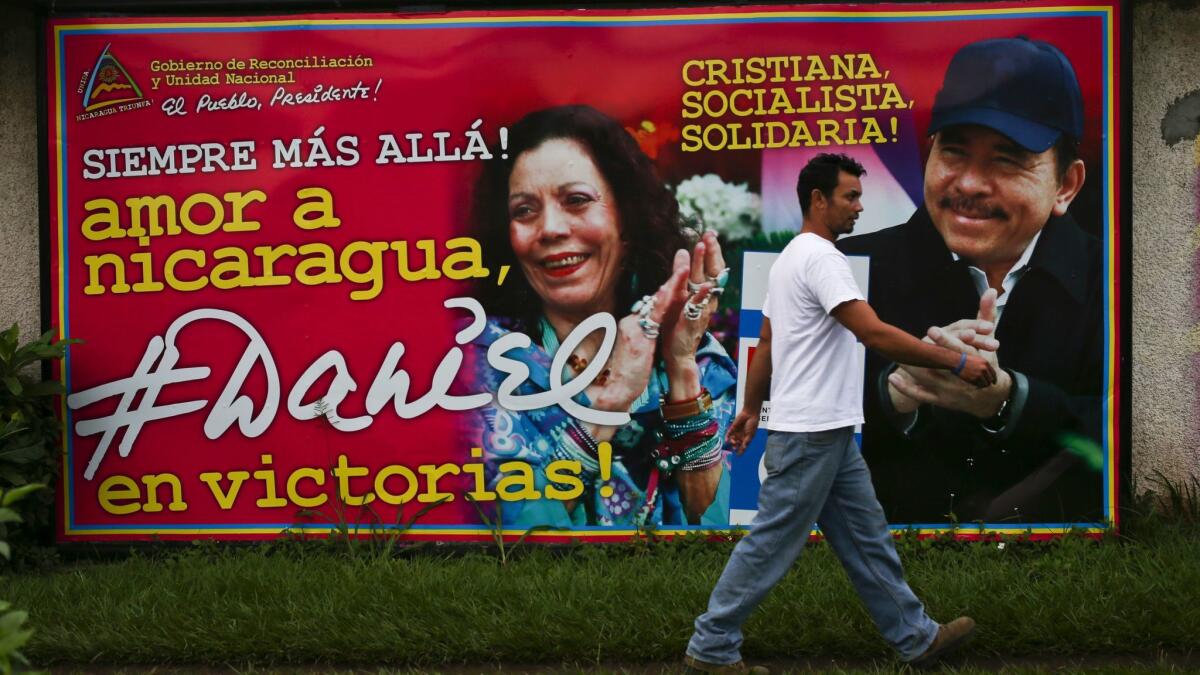Nicaraguan President Daniel Ortega appears headed to reelection, with his wife as vice president

- Share via
Reporting from MANAGUA, Nicaragua — Nicaraguans go to the polls Sunday in controversial national balloting that is expected to result in the reelection of President Daniel Ortega, the ex-guerrilla commander who critics say has evolved into an autocrat.
Running alongside Ortega as his vice presidential candidate is his flamboyant wife, First Lady Rosario Murillo, a charismatic if divisive figure widely viewed even before the vote as Nicaragua’s de facto co-ruler.
Surveys indicate that voters will give a third consecutive five-year term to Ortega, whose preelection maneuvers in conjunction with an allied judiciary have largely sidelined a divided opposition. Detractors have denounced the balloting as a “farce” and many opponents have called for a boycott. High abstention rates are expected, polls show.
“The elections are controlled by a single party,” complained university student Julio Salazar, who, like many others, says he plans not to cast a ballot. “We are left with no options.”
Ortega, standard-bearer for the ruling Sandinistas, has labeled international election observers “shameless” and kept them out of the country.
The U.S. State Department has said it is “gravely concerned” about Nicaraguan government efforts “to limit democratic space” in the run-up to the balloting.
But Ortega has many loyal supporters, including multitudes of low-income Nicaraguans who have benefited from the government’s social largesse.
“I am living under a roof thanks to God and the government that gave me this opportunity,” said Ana Maria Siles, 63, whose family is among the beneficiaries of a signature Sandinista program that provides free metal roofing to needy Nicaraguans.
Even many critics acknowledge that Ortega could win without what they view as vote rigging and politically motivated judicial actions that have marginalized the opposition.
There is little sign here of the kind of intense political contests that are now the norm in Latin America and that have unfolded previously in Nicaragua. The end of the Cold War and the demise of U.S.-backed military dictatorships have contributed to a more competitive political environment in much of Latin America.
“There’s absolutely no electoral campaign here, by any party,” noted Ernesto Mendoza, a perplexed office worker waiting for a taxi on a main drag in Managua, the capital. “It’s a lot different from past elections.”
Under Ortega’s rule, the country has maintained moderate economic growth, and though Nicaragua remains one of the poorest nations in the Americas, government-backed programs have helped reduce poverty. Nicaragua also is notably less violent than Honduras and El Salvador, which have among the world’s highest homicide rates.
Ortega was a guerrilla commander in the Sandinista uprising that ousted the U.S.-backed government of Anastasio Somoza in 1979. He had spent seven years in Somoza’s prisons. Ortega was first elected president in 1985, lost a reelection bid in 1990 amid a national economic meltdown but successfully regained office in 2006.
Despite Ortega’s Marxist roots and his frequent “anti-imperialist” rhetoric, his government has cooperated with the United States on drug trafficking and other concerns.
I am living under a roof thanks to God and the government that gave me this opportunity.
— Ana Maria Siles, 63, beneficiary of a Sandinista program
Murillo, a 65-year-old longtime Sandinista activist known as Companera Rosario, serves as chief government spokeswoman. The European-educated Murillo, a poet, regularly appears on television, cheering the Sandinista leadership, reciting poetry and doling out New Age-style counsel and dabs of her personal social philosophy. By contrast, her husband rarely gives interviews and seldom appears in public.
Murillo, who favors colorful garb and accessories reminiscent of the hippy era, also championed the installation of giant metal tree sculptures in Managua, adding a striking if somewhat kitschy feel to the generally drab capital.
The presence of the eccentric Murillo on the ticket has generated criticism that Ortega — who turns 71 this month — is aiming to create a new family dynasty, a left-wing incarnation of the right-wing Somoza family dictatorship that ruled from the 1930s to 1979. Even some Sandinista insiders were unhappy with the choice of Murillo, the press here has reported.
Ortega and Murillo have seven children together. Various Ortega family members control businesses and media outlets.
Many former Sandinistas have broken with Ortega, calling him a would-be caudillo, or strongman, and disparaging his movement as a personality cult — “Orteguismo” or “Danielismo.”
Among those publicly expressing fears about “another family dynasty” emerging in Nicaragua is Dora Maria Tellez, an ex-Sandinista leader. She has announced her intention not to vote.
“The first circle of loyalty of the dictators is the family,” Tellez said.
Murillo’s dedication to her husband is unquestioned. She stood by Ortega when her daughter from a previous marriage, Zoilamerica Narvaez, publicly accused Ortega in 1998 of having sexually abused her since age 11. Murillo called on her daughter to withdraw the charges. A Nicaraguan judge dismissed the case and Ortega survived the scandal.
“Ortega picked Murillo for many reasons,” said Oscar Rene Vargas, a political analyst here. “She is the most loyal. She ensures the family succession…. [And] she can preserve the political and economic activities of the family.”
Special correspondent Miranda reported from Managua and Times staff writer McDonnell from Mexico City. Cecilia Sanchez of The Times’ Mexico City bureau and staff writer Tracy Wilkinson in Washington contributed to this report.
ALSO
Venezuela’s political crisis deepens, with parliament in standoff with president
Police in India said they killed 8 ‘terrorists’ in a shootout. Recordings told a different story
Smiling children, open graves: Scenes from the battle for Mosul
More to Read
Sign up for Essential California
The most important California stories and recommendations in your inbox every morning.
You may occasionally receive promotional content from the Los Angeles Times.












